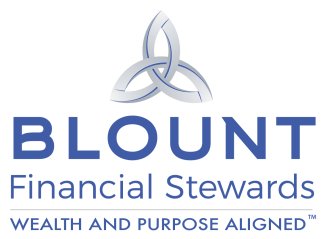
The Market Isn’t Your Messiah: Stop Letting Fear Preach Louder Than Faith
Jonathan Blount | Sep 10, 2025
#Investments, #Finance, #Savings #Risk Management
The Dow crosses 45,000, and your brain whispers: This has to be the top.
The market drops 15 percent, and your brain screams: Get out before it gets worse!
Different scenarios, same outcome: fear interrupts faith, and your brain hijacks your long-term plan.
If you have ever felt paralyzed by market highs or panicked during market lows, you are not an outlier. You are human. But as a follower of Christ, you are also called to remember that the market is not your Messiah. It cannot save you, it cannot secure you, and it cannot determine your ultimate peace. The voices of fear and greed are loud, but they are not the Voice of God.
Your Emotional Brain Does Not Understand Faith or Math
The Creator designed your brain to react quickly to immediate danger. That wiring is a gift when you are avoiding a snake on the path, but it misfires when applied to complex, long-term systems such as financial markets.¹
At market highs, the fear of loss dominates. What goes up must come down feels like physics, not psychology.
At market lows, the fear of more loss dominates. This could go to zero feels inevitable, not improbable.
In both cases, your brain is running the same ancient survival program: avoid pain at all costs. That kept your ancestors alive when quick decisions meant survival, but investing is not about split-second reactions. It is about patient, deliberate decisions that compound over decades.
Your emotional brain does not do decades. It does right now. And right now is rarely the whole story. Faith lifts our eyes beyond the moment and fixes them on the Author of history, who reminds us that stewardship is always about long horizons, not just the headlines.
The Mental Traps That Work Both Ways
Whether markets are soaring or crashing, the same cognitive biases conspire against your long-term faithfulness:
- Recency Effect: Whatever happened recently feels most likely to continue.²
- Anchoring Bias: A stock at $100 feels expensive if you remember it at $75, but cheap if you remember it at $125 regardless of its actual value.²
- Loss Aversion: Losses feel about twice as painful as equivalent gains feel good.²
- Confirmation Bias: When you are scared, you seek information that validates your fear.²
These are not character flaws. They are universal human wiring that even professional investors battle.² Yet Scripture teaches us to “walk by faith, not by sight” (2 Corinthians 5:7). What feels certain is not always what is true.
The 2008 Scar
If you are in your fifties or sixties, there is another layer to this struggle.
You lived through 2008. I did too, because in 2009 I was entering financial services during the aftermath of that season. I watched the crisis unfold in real time, not from the outside, but while sitting with clients whose dreams and retirements were suddenly under threat. Some panicked and sold at the bottom, locking in losses that they never fully recovered from. Others chose to reallocate, adjusting their portfolios to reflect new realities. And many, after hard conversations, held their ground and stayed the course.
The difference was stark. Those who abandoned their plan often lost forever, not only in dollars but in confidence. Those who stayed invested, despite their fear, came out on top when markets recovered.
That is why I still carry 2008 with me. It was a crucible that formed my conviction that fear is never a faithful financial strategy. The memory of loss is real. The trauma of that season still shapes reactions today. But here is what we must not forget: even investors who bought at the 2007 peak had fully recovered by 2013.³ Those who remained invested through the storm came out ahead.³
Your emotional memory of 2008 is valid, but it may be distorting your perception of both current risks and opportunities. Faith reframes the memory. What looked like the end in 2008 became another chapter in God’s provision for those who endured.
What the Data Shows
Trying to sidestep downturns might feel like prudence, but long-term data suggests it is often more effective to stay consistently invested.
Morningstar analyzed two approaches: one that invested steadily over time, and another that attempted to hold cash when the market appeared overvalued. Over a 21-year period, the steady investment strategy delivered stronger results.⁴
Why? Because markets do not reward perfect timing. Gains and recoveries often occur when conditions still feel uncertain. Waiting for the “right” moment can lead to missed opportunities. While no approach eliminates risk, consistent exposure has historically helped investors capture more of the market’s long-term growth without relying on short-term predictions.
The Risk Many People Ignore
While you wrestle with whether the market is “too high” or “too dangerous,” another threat quietly erodes wealth: inflation.
That “safe” money earning two percent in savings is losing purchasing power every year inflation runs near three percent.⁵ Over time, that is a significant portion of buying power lost.
Perhaps the market drops twenty percent next year. No one knows. But one thing is certain: if your money is not growing faster than inflation, you are losing ground. Which risk feels more manageable: temporary volatility or ongoing erosion?
What Strategy Looks Like
Investment strategy is not about predicting market direction. It is about building a plan that works regardless of what markets do. That requires:
- Having a clear timeline: If retirement is 5+ years away, temporary drops matter less. If you are near retirement, keep 1–2 years of expenses in more conservative assets.⁶
- Defining your risk tolerance honestly: Not by how you feel in the moment, but by what you can actually live with.
- Automating consistent behavior: Keep investing regularly and rebalance to maintain discipline.
- Aligning with your values: Know why you are investing so short-term noise does not derail your eternal purpose.
As Jesus asked in Matthew 6:27, “Which of you by worrying can add one cubit to his stature?” Worry does not produce wisdom. Anchoring to God’s promises does.
Building Your Emotional Firewall
Deliberate investing is not about eliminating fear. It is about making decisions despite fear when evidence and long-term planning support staying the course.
That requires an emotional firewall: principles that work when your feelings will not. These include:
- A written investment policy created during calm moments
- Automatic contributions regardless of headlines
- Regular rebalancing
- A trusted advisor to provide perspective
- A clear “why” for your investment journey
This is also where I introduce a tool from my proprietary Process to Believe In®: the Steward’s Shield®. The Steward's Shield® is a Gospel-centered risk management framework designed to guard your financial life against the twin threats of fear and greed. It is not built on speculation or guesswork, but on convictions about God’s provision and your calling as His steward.
Each part of the Steward’s Shield® addresses a key dimension of protection, covering your family, your future, and your legacy. With the Seward's Shield® in place, you are not left unguarded when uncertainty strikes. You have a structure that steadies your responses and reminds you that markets are not your Messiah. Only Christ holds your times in His hands, and your call is to steward faithfully under His covering.
Steward’s Reflection
I still remember sitting with clients in 2008 during training and 2009 in practice, when fear was overwhelming. Some could not hold on, and they lost more than money. They lost the peace of long-term confidence. Others stayed the course, or thoughtfully reallocated, and today they stand as living proof that endurance bears fruit. That experience marked me. It convinced me that no amount of fear, no matter how loud, should be allowed to preach louder than faith.
So ask yourself:
- What has actually changed about my long-term plan?
- Am I reacting to prices or to fundamentals?
- How will I feel in five years if I let fear, rather than faith, drive my decisions?
Sometimes the most valuable thing is not a new plan. It is someone to help you keep faith with the one you already have.
The market is not your Messiah. Stop letting fear preach louder than faith.
Footnotes
- The Decision Lab. “Why Our Brains Sabotage Long-Term Thinking.” Research and Reviews International Journals, 2023.
- Ibid.
- YCharts. “S&P 500 Recovery Timeline: From Peak to Recovery After the 2008 Crisis.” Historical market data, 2013.
- Morningstar. “Timing the Market vs. Staying Invested: A 21-Year Study.” Morningstar Research, 2022.
- Kiplinger. “Inflation and the Erosion of Savings Returns.” Kiplinger’s Personal Finance, 2022.
- Morningstar. “Retirement Planning Asset Allocation Guidelines.” Morningstar Research, 2023.
This content is developed from sources believed to be providing accurate information. The information provided is not written or intended as tax or legal advice and may not be relied on for purposes of avoiding any Federal tax penalties. Individuals are encouraged to seek advice from their own tax or legal counsel. Individuals involved in the estate planning process should work with an estate planning team, including their own personal legal or tax counsel. Neither the information presented nor any opinion expressed constitutes a representation by us of a specific investment or the purchase or sale of any securities.
Articles may include hypothetical examples for educational purposes and may not be representative of any specific situation. Your results will vary.
Stock investing includes risks, including fluctuating prices and loss of principal. All performance referenced is historical and is no guarantee of future results.
There is no guarantee that a diversified portfolio will enhance overall returns or outperform a non-diversified portfolio. Diversification, asset allocation and rebalancing do not protect against market risk. Rebalancing a portfolio may cause investors to incur tax liabilities and/or transaction costs.
